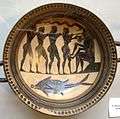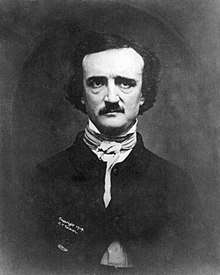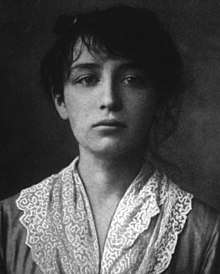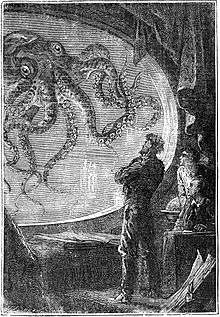Outis
Outis (transliteration of Ancient Greek Οὖτις, in capitals ΟΥΤΙΣ, from οὔτις "nobody" or "no one")[1] is an often used pseudonym. Artists, writers and others in public life use this pseudonym in order to hide their identity. The Latin equivalent Nemo is also often used.
Origin of the name

"Outis" was used as a pseudonym by the Homeric hero Odysseus, when he fought the Cyclops Polyphemus, and had put out the monster's eye. Polyphemus shouted in pain to the other Cyclopes of the island that "Nobody" was trying to kill him, so no one came to his rescue. The story of the Cyclops can be found in the Odyssey, book 9 (in the Cyclopeia). The name Nobody can be found in five different lines of Chapter 9. First of all in line 366:
"Cyclops, you asked my noble name, and I will tell it; but do you give the stranger's gift, just as you promised. My name is Nobody. Nobody I am called by mother, father, and by all my comrades."
Then in line 369:
So I spoke, and from a ruthless heart he straightway answered: "Nobody I eat up last, after his comrades; all the rest first; and that shall be the stranger's gift for you."
Then in line 408:
Then in his turn from out the cave big Polyphemus answered: "Friends, Nobody is murdering me by craft. Force there is none." But answering him in winged words they said: "If nobody harms you when you are left alone, illness which comes from mighty Zeus you cannot fly. But make your prayer to your father, lord Poseidon".
In line 455:
"Are you sorry because that wicked Nobody brought your master down with drink and blinded him?".
And in line 460:
"I should thus have some revenge for the harm that no-good Nobody has done me".
Uses of the pseudonym Outis

- In the New York Evening Mirror (January 14, 1845), Edgar Allan Poe denounced the poet Henry Wadsworth Longfellow as a plagiarist. Longfellow remained silent on the matter, but a defender for Longfellow did appear, an anonymous writer who signed his letters only as "Outis". Speculation as to the identity of Outis has mentioned Cornelius Felton, Lawrence Labree,[2] and Poe himself.
- Henry Stevens was an American rare book dealer, and a graduate of Yale University. In 1845 he went to London 'on a book-hunting expedition' and remained there until his death in 1886. As an antiquarian he helped to build up several great American libraries. In 1877, under the pseudonym of 'Mr. Secretary Outis,' he projected and initiated a literary association named The Hercules Club.
- István Orosz (1951-), Hungarian visual artist, uses the pseudonym Utisz, a phonemic respelling of the Greek Outis: that is, both are pronounced /utis/. The hidden meaning of the ancient tale is very close to the visual pitfalls created by Orosz. He likes to use visual paradox, double meaning images and optical illusion – all of them are some kind of attack upon the eye, an Odysseus' gesture in a symbolic way.
Orosz doubles even himself: from time to time, he signs his works as Utisz, the pseudonym borrowed from Cyclopeia. The most artful Greek, Odysseus, also used as a pseudonym the word meaning No-man, and as we know, with that exchange of names, then Polyphemos the Cyclops’ eye came into the world. The gouging out of the eye, or deception to the eye, also accompanied the works of Orosz/Utisz, if only metaphorically. Trompe l’oeil – we refer with an art historical expression to those images in which illusion guides the gaze. Orosz often uses such artifice, though he is completely aware of the danger of these deceptive procedures. He put it this way at a symposium a few years back: I hope my intentions are clear, in the ambitions of a Hungarian artist at the turn of the century, who does not tell the truth only to be caught in the act. (Introduction by Guy d'Obonner)
- Pseudonym of Henri Antoine Meilheurat des Pruraux for O il cattolicismo o la morte in Leonardo nr 7 (29 March 1903).
- Kaniel Outis is the pseudonym used by the protagonist, Michael Scoffield, in the fifth season of the TV series Prison Break. This is one of the story's parallel's with the Odyssey; others including the protagonist's imprisonment in the fictional Ogygia prison (named after Ogygia, in which Odysseus was imprisoned by the nymph Calypso), the main antagonist's code name being Poseidon, and the protagonist's struggle to return home to his wife, who lives in Ithaca, New York.
Uses of the pseudonym Nemo


- Hablot Knight Browne (1815–1882) was a British graphic artist, well known as Charles Dickens's illustrator. Among others he illustrated The Pickwick Papers, David Copperfield and Martin Chuzzlewit. Browne adopted the pseudonym "N. E. M. O." Soon, however, he became "Phiz," a pseudonym well suited for the creator of "phizzes"—delightful caricatures, as seen in his illustrations. Nemo is also the given name of the scrivener with a secret in Dickens's Bleak House.
- Camille Claudel (1864–1943), a French sculptor and graphic artist (as well as Auguste Rodin's model, student and lover) had a pet canary named Nemo. It was mentioned as alter ego of Camille Claudel in some personal letters by Rodin.
- Captain Nemo is a fictional character of Jules Verne's novels Twenty Thousand Leagues Under the Sea and The Mysterious Island. Captain Nemo is a mysterious hero and a scientific genius who roams the depths of the sea in his submarine, the Nautilus, which he built on a deserted island.
- Little Nemo is the main character in a series of comic strips by Winsor McCay (1871–1934), which appeared weekly in the New York Herald between 1905 and 1913.
- Finding Nemo
Other "Nobody" pseudonyms
- My Name is Nobody (Il mio nome è Nessuno; also known as Lonesome Gun) is a 1973 spaghetti western comedy film, directed by Tonino Valerii and by Sergio Leone.
- A Native American character in the Western film Dead Man calls himself Nobody.
- No One is a nu metal music group from Chicago, Illinois. The original name of the four-piece band was Black Talon. They have been active since 1994.
- Harold Cohen (1854-1927), an American author, wrote science fiction novels under the pseudonyms Harry Enton and "Noname." After some titles his well-known series Frank Reade was continued by Luis Senarens (1865–1939) who used "Noname" as well.
- Doctor Who The Doctor's anonymity is influenced by the anonymous Time Traveler in the novel The Time Machine by H. G. Wells.
See also
- Alan Smithee
- Luciano Berio (composer of Outis, a musical action in 2 parts)
- István Orosz
References
- οὔτις. Liddell, Henry George; Scott, Robert; A Greek–English Lexicon at the Perseus Project.
- Ljungquist, Kent (2009). A Further Note on Lawrence Labree. The Edgar Allan Poe Review Vol. 10, No. 2 , pp. 122-128.